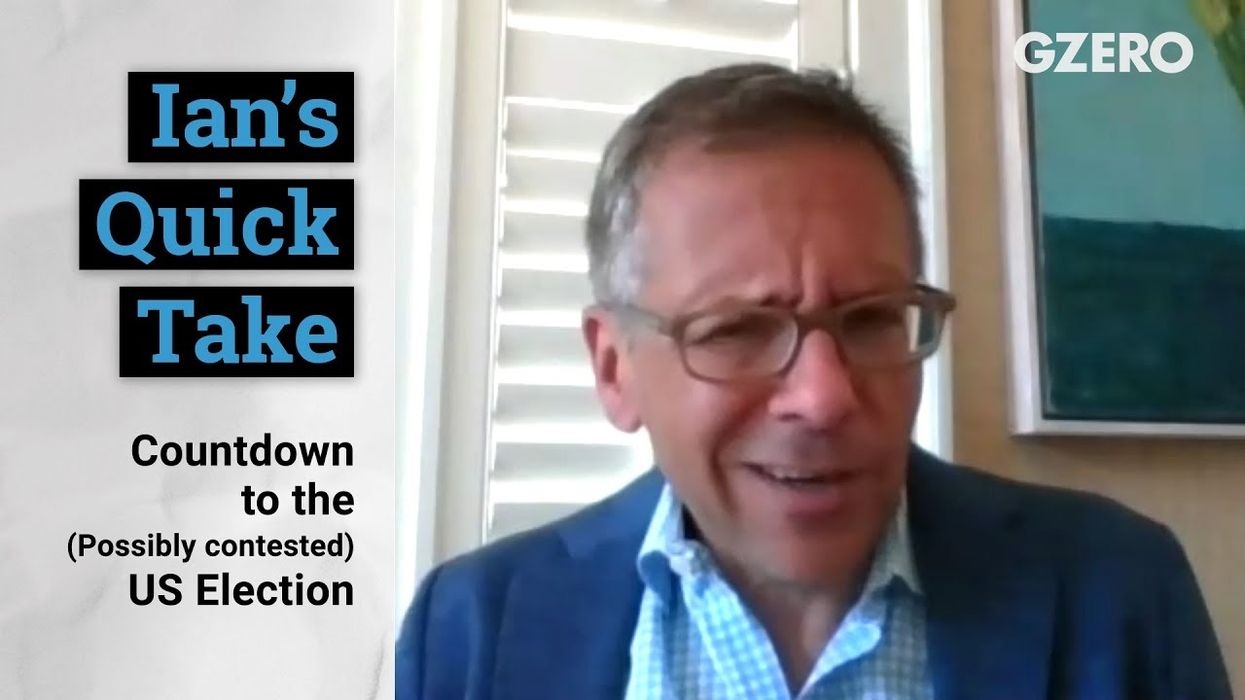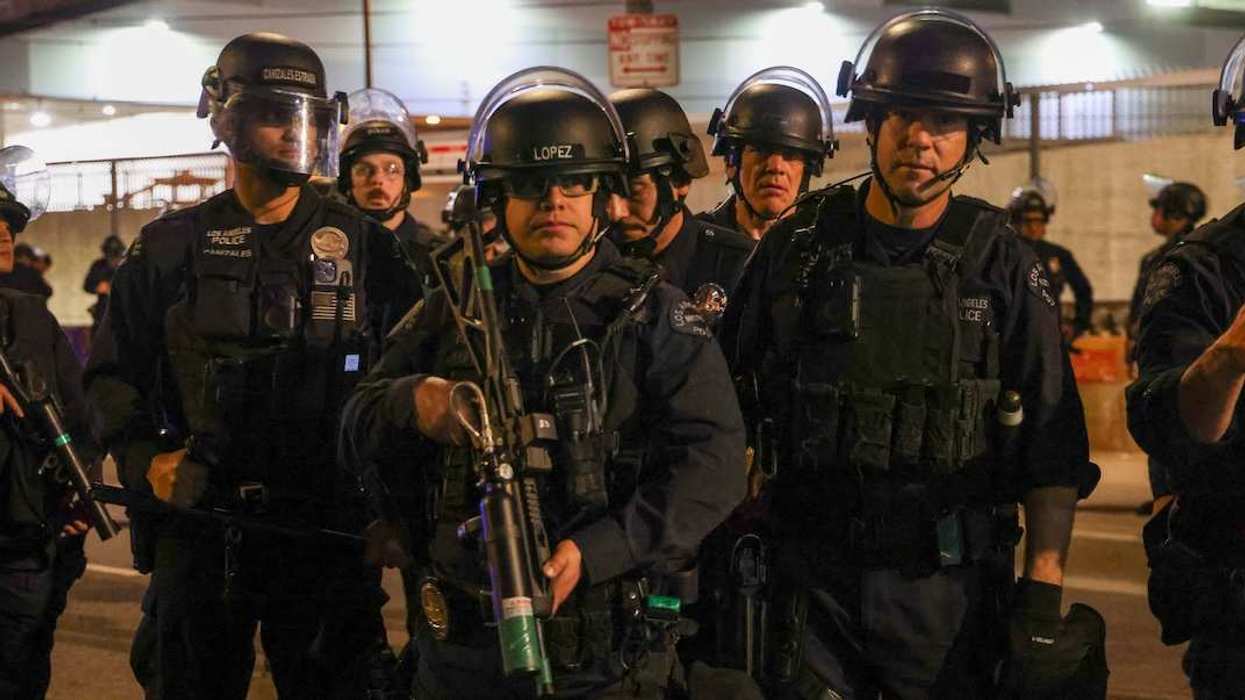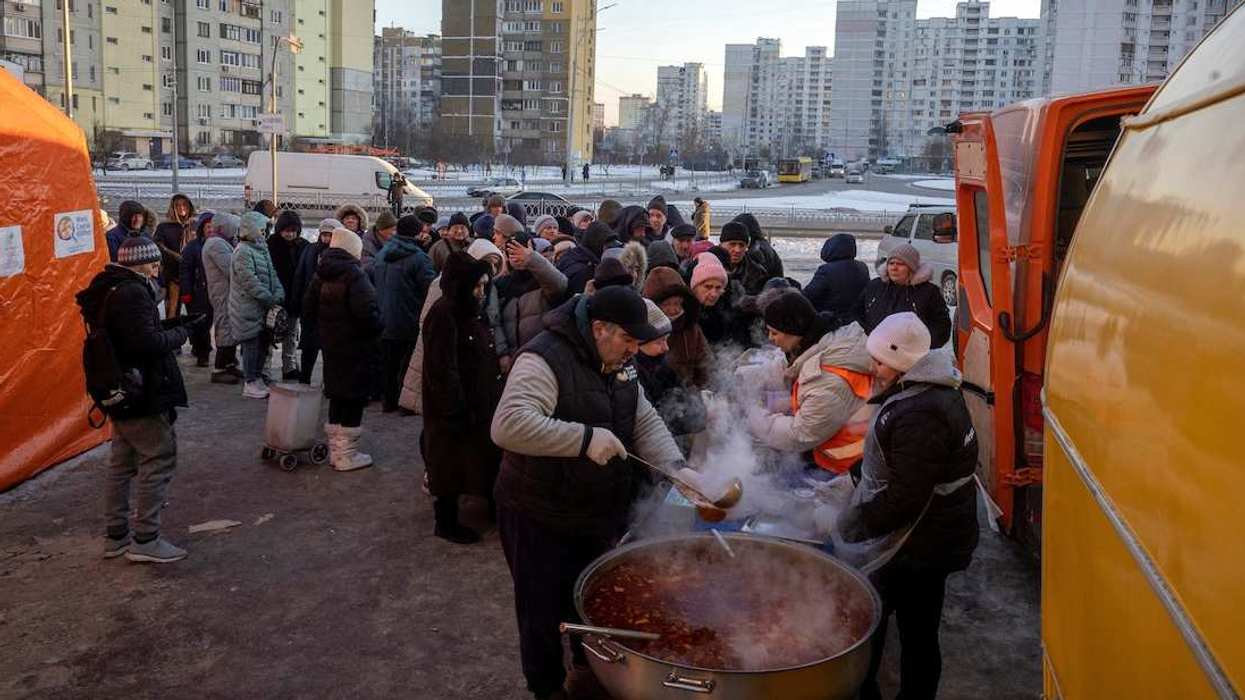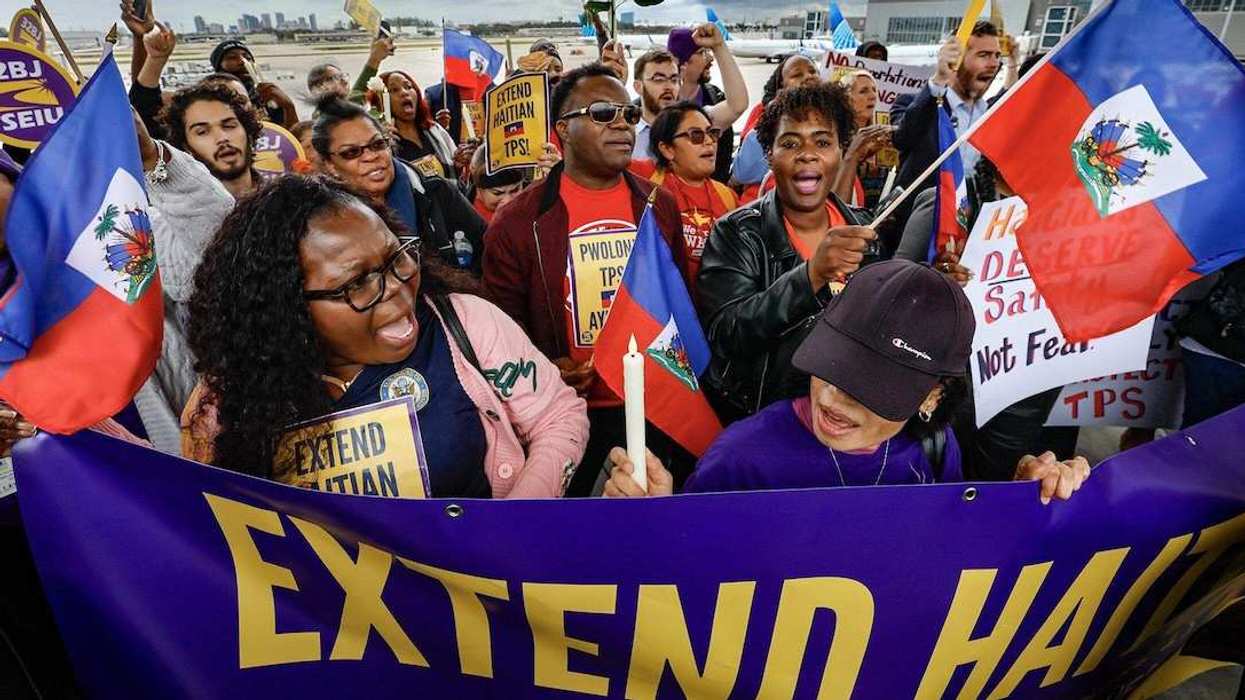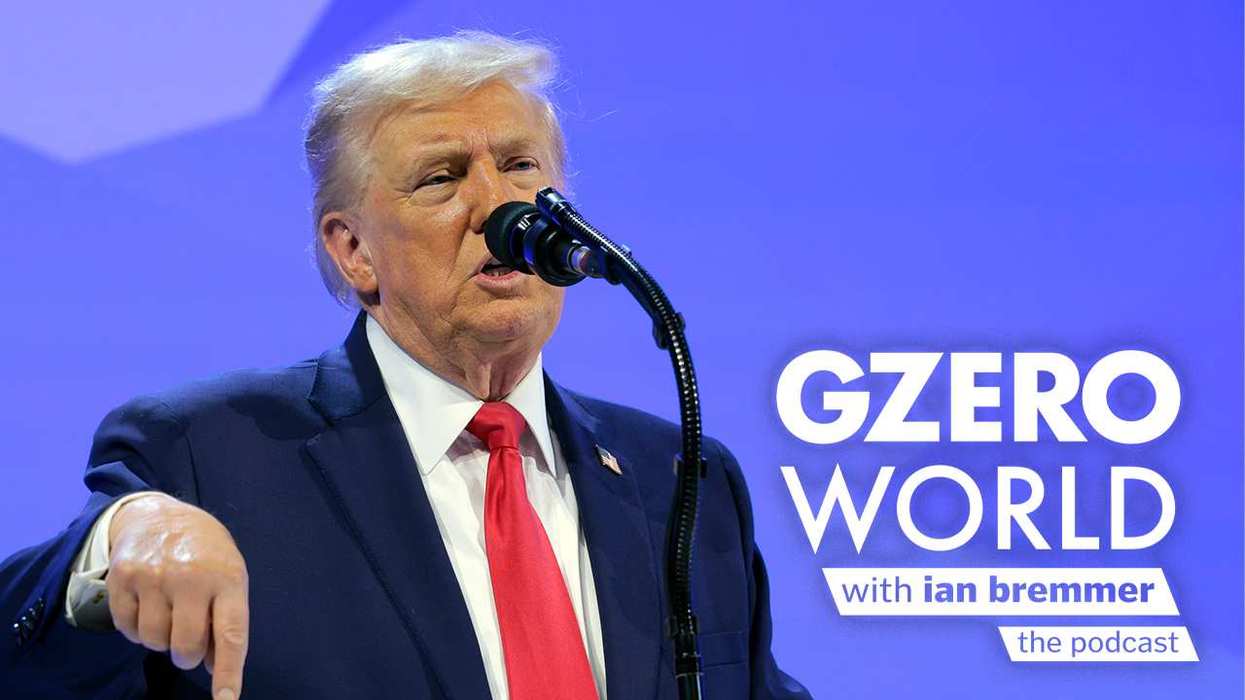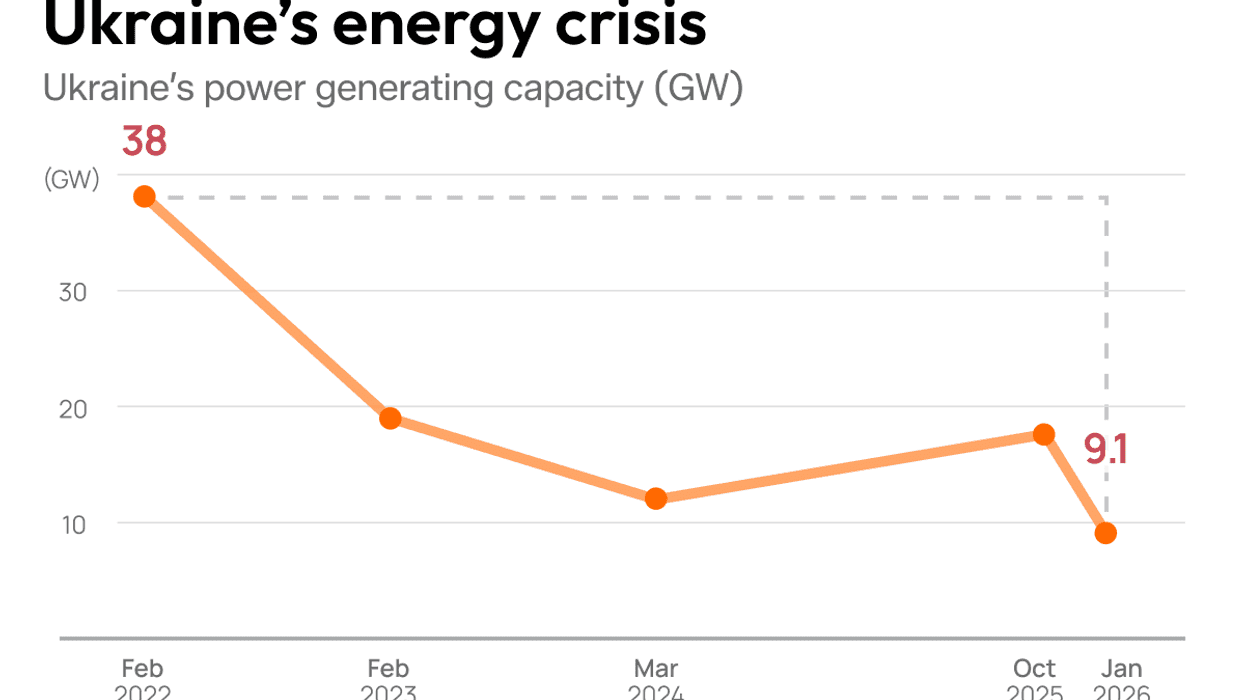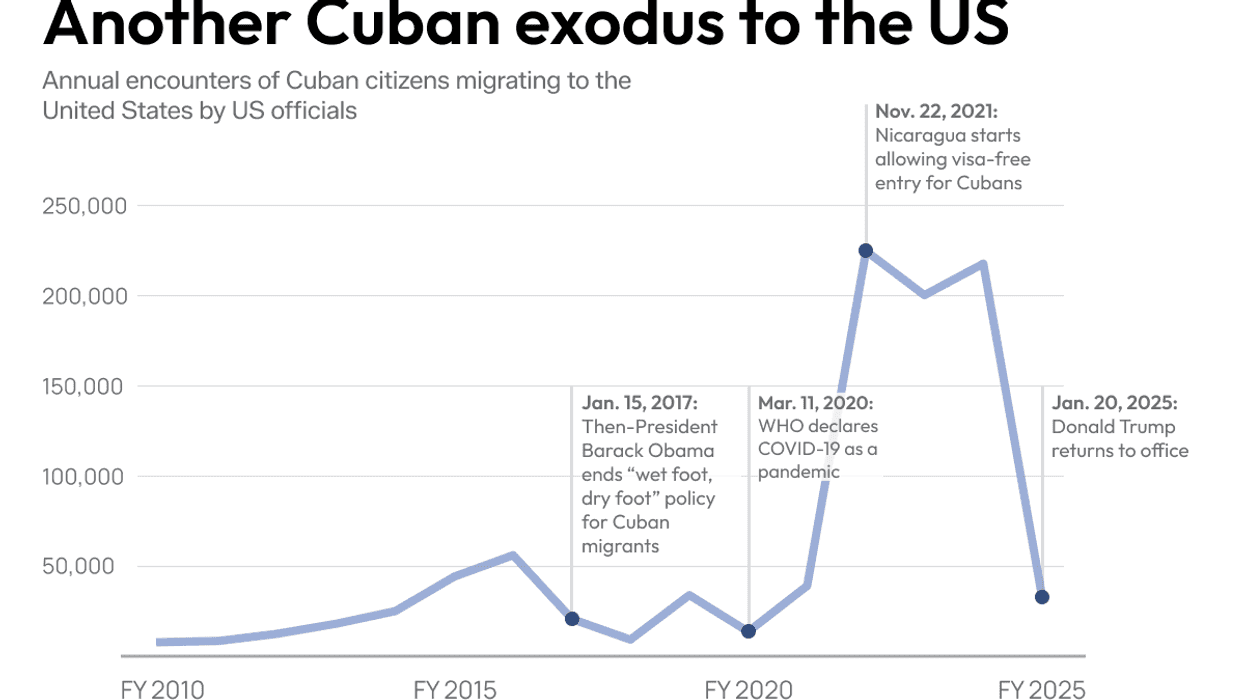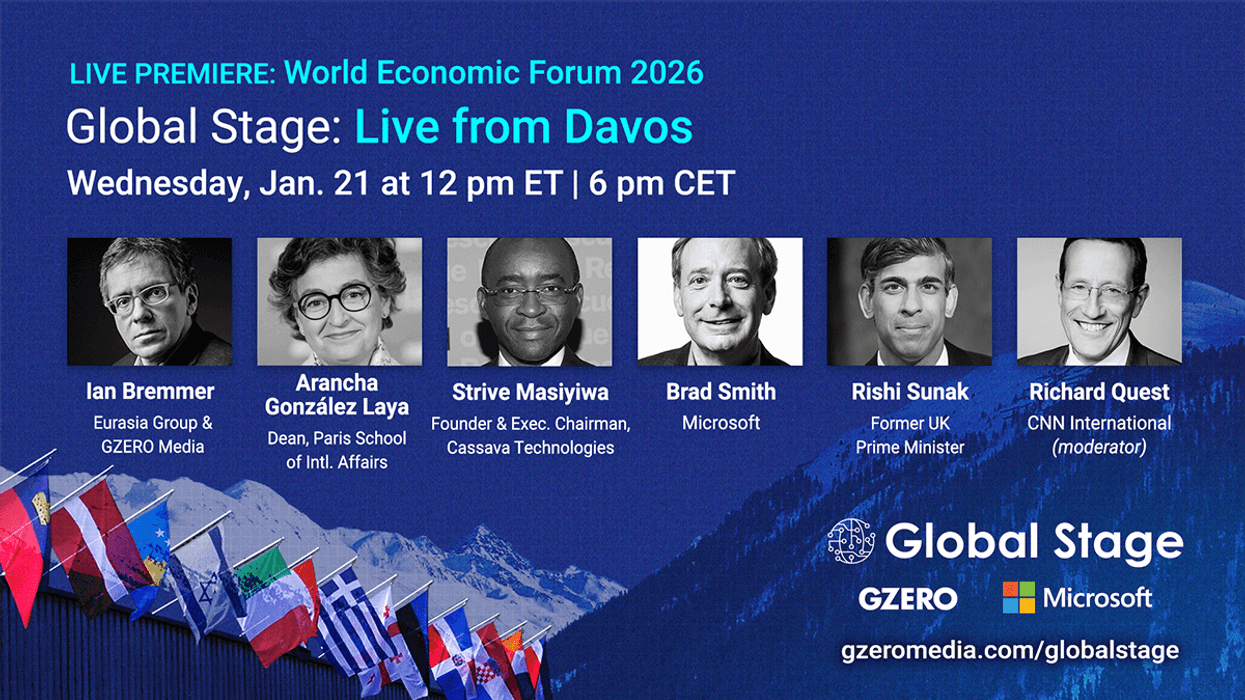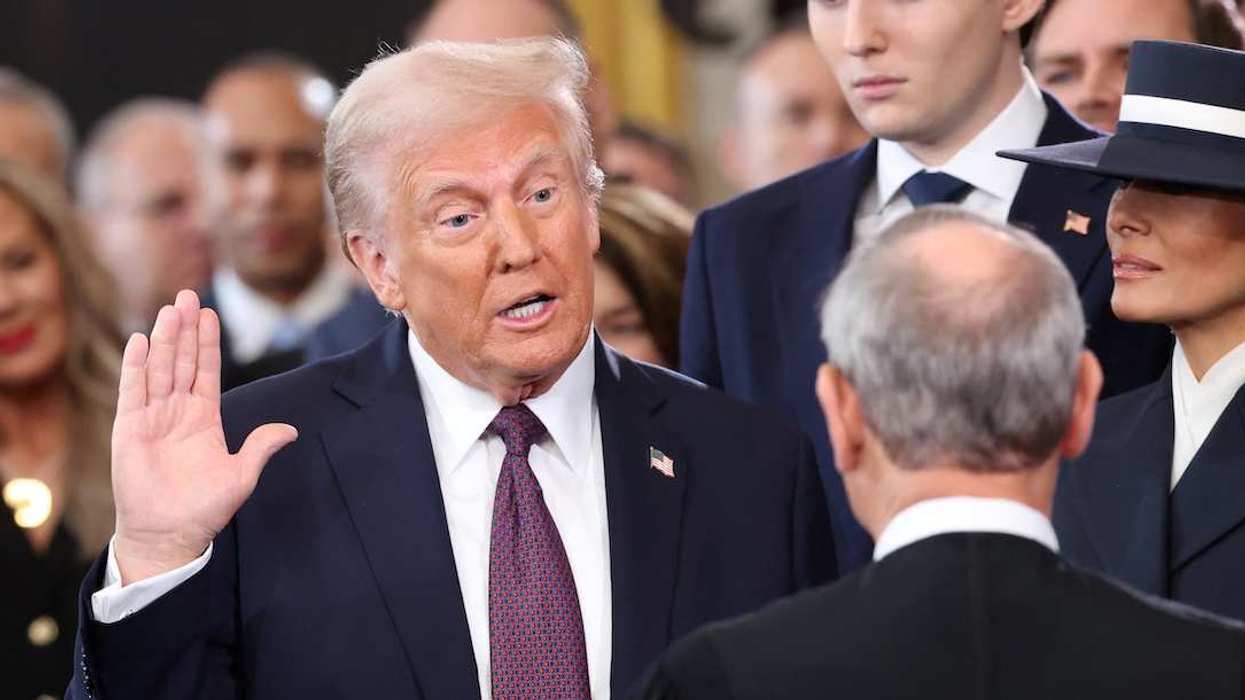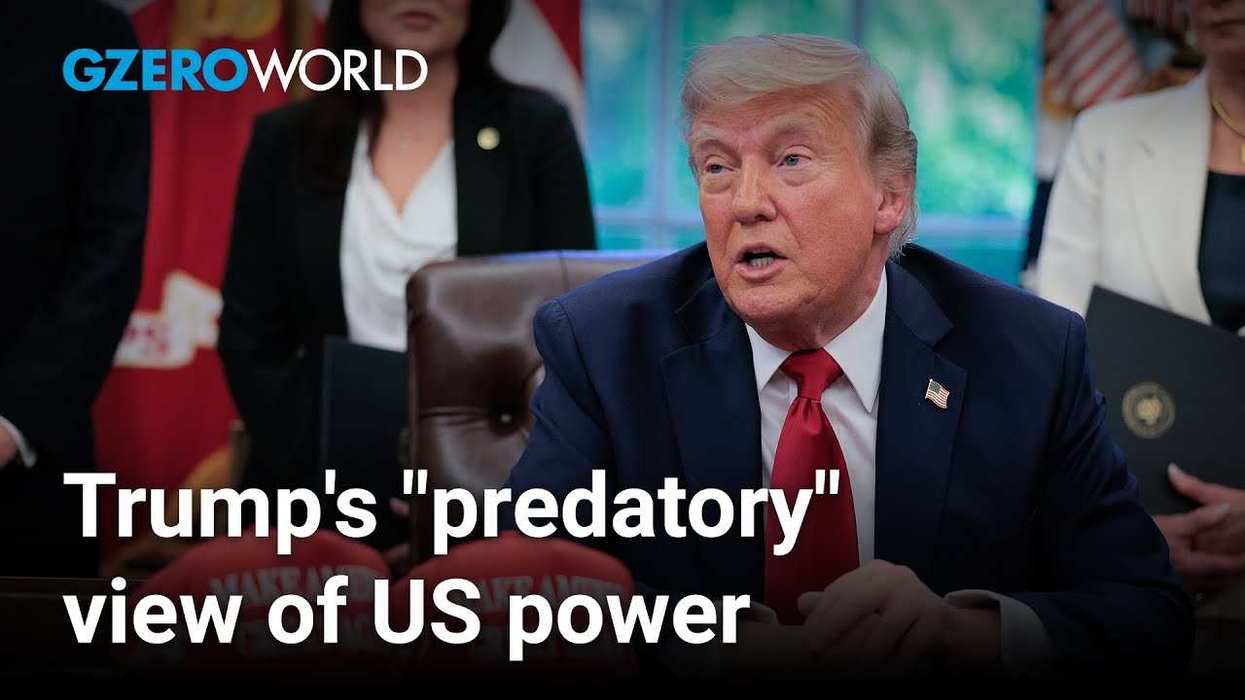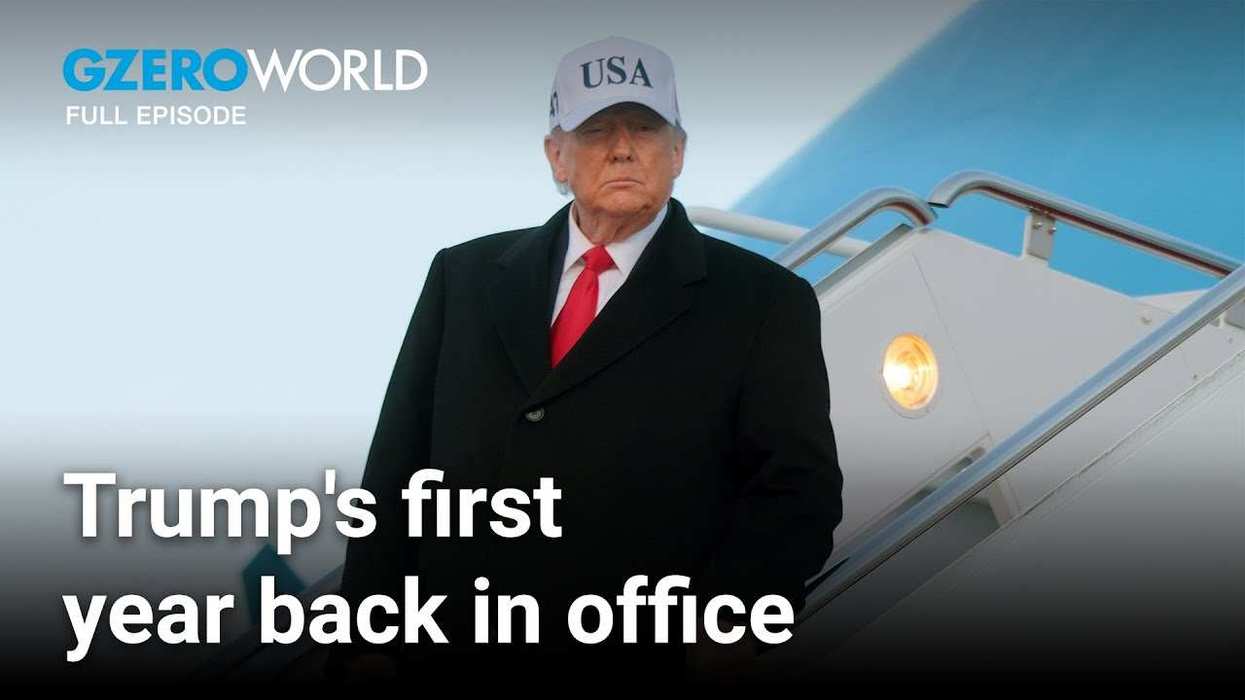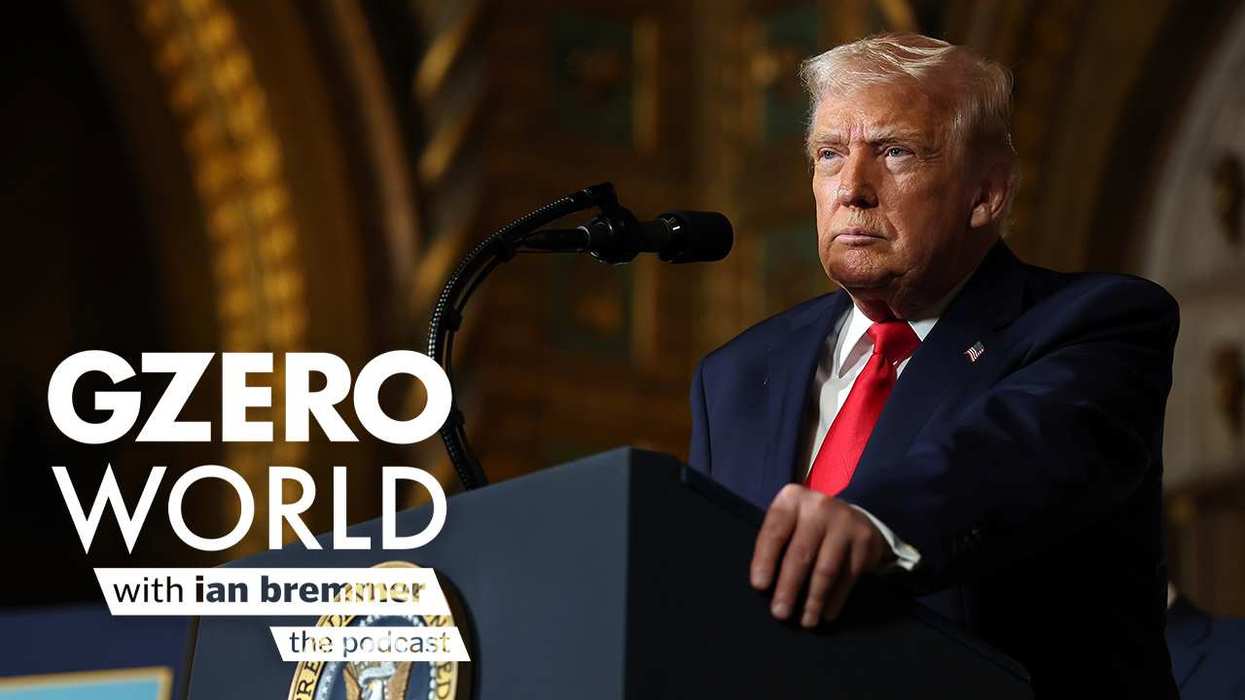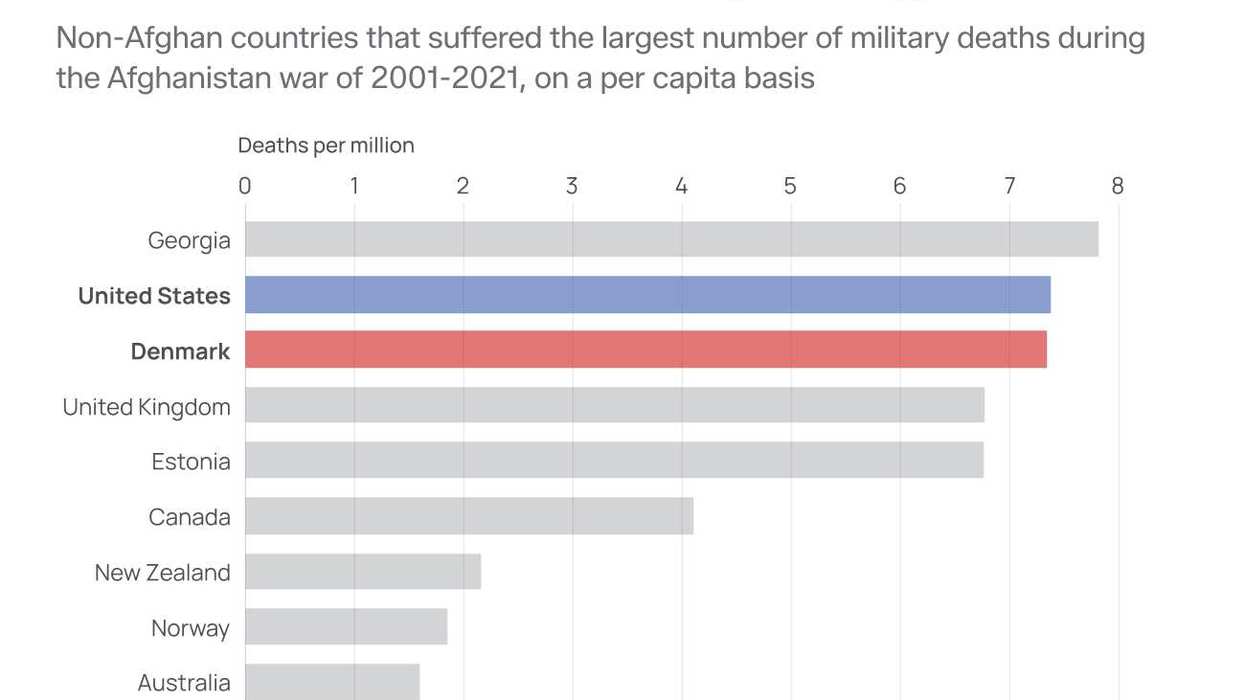VIDEOSGZERO World with Ian BremmerQuick TakePUPPET REGIMEIan ExplainsGZERO ReportsAsk IanGlobal Stage
Site Navigation
Search
Human content,
AI powered search.
Latest Stories
Sign up for GZERO Daily.
Get our latest updates and insights delivered to your inbox.
Global Stage: Live from Davos
WATCH
US & Canada
Presented by
Ian Bremmer's Quick Take:
Normalcy is incrementally coming to the United States, if not yet to a lot of developing markets, but certainly to Europe, certainly to China. And I haven't spent a lot of time talking about the US election yet, certainly nothing close to the media coverage. I thought I would today because we've got 99 days until November 3rd. You say 100 days yesterday, sounds like a bigger deal, but that's only because we have a base 10 numeric system. If we had a base three numeric system, 99 days out would be pretty meaningful, right? But no, I thought let's finally, right, we've got these massive, incredibly expensive, billions of dollars spent, a year and a half of the entire process, I mean, by far a greater subversion of democracy, the way the US elections are held than any other advanced industrial democracy in the world. We all know it. Democrats, Republicans, people sick of the party system. We all recognize nothing can be done about it. It's fantastic for special interests that spend an immense amount of money trying to ensure that candidates do their bidding. But now that we are only 99 days out, political polls really do start to matter. We know who the candidates are on both sides. We don't yet have the V.P. on the Biden side. But still, I mean, we're pretty close. 100 days out, 99 days out, you feel like you can start paying attention.
So, what do I think? Well, first, you know, on the Trump side, it is very obvious that he is well behind in the polls. Let's keep in mind he was generally well behind in the polls in 2016. But this time around, not only do you have a candidate running against him that is not nearly as controversial or as toxic to a part of the population as Hillary Clinton was, but also just the general backdrop, conditions for an incumbent are really challenging. The economic contraction going on longer than a lot of the bankers and the economists have expected. You're talking about an 8% contraction likely or more of the US economy this year. Certainly, double digit unemployment, meaningful double-digit unemployment at the time that we have the election. Challenges in continuing to get stimulus in place, though, I do think this latest round four of a trillion plus is going to happen and Congress will go nowhere, they won't leave session until they get something done.
And also on the coronavirus situation, you still give 30% of people approving the way Trump is responding to coronavirus, the numbers of deaths, the numbers of hospitalizations, the view that it's been mishandled. Yes, at the federal as well as at the state and at the local level. But ultimately, the buck stops with the president. Whoever the president is, if those things go badly, it tends to hurt them. And then on top of that, you have all of the the protests, the social discontent, Black Lives Matter, the anti-government demonstrations happening in Portland and other places, and the response from federal authorities increasingly, all of that bodes badly for Trump. It's why he is under water, not just in national polls, which don't matter very much, but also in swing state polls, which really do.
So, if you look at those polls, like in 2016, you expect Trump is going to lose and lose pretty big. And I will say that almost all of my Democrat friends have been telling me they're more than willing to bet not only that Biden will win, but most of them are willing to bet that Biden is going to win by a landslide. I am not there. And I'm not there, not just because it's still early, because increasingly 99 days, you can't say it's that early, these polls, you know, do start to hold to a greater degree. So, if you're betting person, you would be betting in favor of Biden against Trump right now. But the big, big difference between 2016 and 2020 is that this coronavirus and the level of crisis, the extraordinary level of crisis domestically in the US, means that the ability to hold an election is itself more challenged. And President Trump, who continues to post regularly that it's rigged and that there's all sorts of problems with the primaries and problems with mail-in ballots and the rest, in 2016 he wasn't president, in 2020 he is, which means his ability to use, to leverage the power of the presidency, to change the way the election is conducted, and to also make lots of people feel that the election has been rigged and mishandled is vastly greater than it would have been in 2016.
We already see that with federal authorities and the Department of Homeland Security going in in Portland against the interests and desire of local elected political officials, very different than what we've seen with coronavirus. Coronavirus. You know, they mishandle it. Trump blames them for mishandling it, but says, not my responsibility. I'm not doing anything. You mishandle local demonstrations and there's a little bit of violence. Trump says, "I'm going in. This is horrible. And I'm going to send those authorities to other cities, too." Why? Because if there's greater violence and the protests become riots and they're seen as out of control, Trump believes that he has a better shot of getting those swing state voters that want law and order wants security, even if they don't like Trump all that much right now, and they're more willing to turn out. But also a greater chance for the president to be able to claim that the system, that the elections need to be held in a more secure fashion, giving the electoral authorities more control over those elections, more ability to say that it's rigged credibly, if the election goes against President Trump. All of those things are happening.
So, yeah, I expect we're going to see more violence because I think that plays into the desire of the incumbent to make people question how this election is actually going to be run. Now, you know, will anyone go along with him? I mean, I think it's virtually guaranteed that if Trump loses, he will say it's rigged. But will anyone go along with him? And I think it's important to recognize two things, the first is that his popularity among Republicans remains very high. There aren't as many people that identify as Republicans as used to. By the way, there aren't as many people identify as Democrats either. Both party affiliations have been going down, as people get more disgusted with the system, though, it's decreased a bit more on the right side of the spectrum, demographic changes in the US also matter in that regard, but the fact that you have a number of Republicans that I mean, you know, well over 85%, well over 90% in many polls, saying that they support Trump even now, no matter what, is very powerful. And it means that Republicans in Congress and Republicans in state legislatures are unwilling to go against the president. You think about the impeachment process, which passed easily in the House but was opposed easily in the Senate because only one Republican senator voted against him, Mitt Romney. Why was that? When you're talking about President Trump interfering politically in the election, trying to get the Ukrainian government to open an investigation against Trump's rival, Joe Biden, he wasn't the nominee the time but there was a decent chance he was going to be, and the answer is, because no matter what Trump does, as long as he's president, the Republicans are supporting him. So, the interesting question will be, if the election occurs and the Democrats say they won and the count shows that the Democrats won, that Biden won, but Trump says, "no, it's rigged," do the Republicans stick with him? And the answer, I think is, it depends on how close it is. I think if it's close, the Republicans are going to stick with him just as they did during impeachment. Even if it's pretty clear from an objective view that the Democrats probably won, I think they would be willing to say, no, it's rigged and make it partisan, make it polarized.
And so you've got a number of swing states where you have Republican legislatures and Democratic governors, and if it's close, you could easily imagine Trump says, "I won, I won those states." He's tweeting it, "I won." Irrespective of what the mainstream media is saying, right? And then you can imagine the legislature's reporting to Congress saying, "that's right, Trump won." While the governors report, "no, actually, Biden won." Now, that has to be decided by Congress. The judiciary, the Supreme Court has ruled on many other sorts of cases that internal voting of Congress is decided by Congress and the Supreme Court judiciary has no ability to weigh in on that. Well, this is the same thing. This would be a question of how Congress decides to handle it. And in the House. It's run by the Democrats. So, in that case, the Democrats would say Biden won. But in the Senate, the Republicans would say actually Trump won.
Well, then what happens? Historically in the United States, that's only happened once. It happened in 1876. There is no legal outcome. You have to create a political outcome. You need a deal. You would need both sides to come together and figure out an agreement on, someone becomes president, in return, there's a give to the other party. Back in 1876, the Republicans got the presidency but the Democrats got a lot of patronage, key slots, to allow them to hand out pork and also had the removal of US troops from the south. Basically ending the reconstruction. The funny thing is, I mean, depending on where federal troops are at that time across the United States, that may well be part of an agreement. I mean, we're not we're not faced in the aftermath of the civil war in the United States, but we are facing something that from a political, from an electoral perspective, only happened once in the history of the US. And I think people are underestimating just how unprecedented the next 99 days are going to be politically in our lifetimes in the United States.
Now, I think that is true if it's close. If it's not close, Trump will still say it's rigged but at that point, the difference is the Republicans no longer need to be with him because he's no longer going to be president. And whether or not Trump is not president still has a lot of influence is an interesting question that we should explore. Otherwise massive number of followers, unlikely Democrats would try to proceed. And actually, you know, indict him on anything in that environment. I think they want to move on and govern. And there are a lot of Trump-light types that are, you know, pretty significant lights in the Republican Party, senator Tom Cotton, you know, certainly Mike Pompeo, and the impact he'll have on the media and social media. So, I'm not someone also that believes that Trump has just gone from the political spectrum. I think Trumpism is going to be here for a while because the anti-establishment sentiment is very significant across the political spectrum in the United States right now. And I don't think that goes from Republican Party if Trump loses. But in any case, a big win by Biden, a sweeping win would mean that you wouldn't have the claims of a rigged election from Trump metastasizing across the Republican Party and therefore that election would get resolved pretty quickly
Keep reading...Show less
More from US & Canada
Renters catch a break
February 04, 2026
Is Trump about to strike Iran (again)?
February 04, 2026
Walmart’s commitment to US-made products
February 04, 2026
What’s Good Wednesdays™, February 4, 2026
February 04, 2026
Is China’s currency coming for the US dollar?
February 04, 2026
Haiti is on borrowed time
February 03, 2026
Building community-first AI infrastructure
February 03, 2026
ask ian
Feb 03, 2026
Why Singapore sees AI as an opportunity, not a threat
February 03, 2026
Quick Take
Feb 02, 2026
The politics of population
February 02, 2026
GZERO World with Ian Bremmer
Feb 02, 2026
Singapore's global moment, with President Tharman Shanmugaratnam
January 31, 2026
Ian Explains
Jan 30, 2026
Graphic Truth: Costa Rica’s severe murder rate
January 30, 2026
Costa Rica’s crime-time election
January 30, 2026
You vs. the News: A Weekly News Quiz - January 30, 2026
January 30, 2026
Why the EU-India trade deal matters
January 29, 2026
What to know about China’s military purges
January 28, 2026
Five forces that shaped 2025
January 28, 2026
What’s Good Wednesdays™, January 28, 2026
January 28, 2026
Two US borders, two different approaches to Trump
January 28, 2026
Walmart’s commitment to US-made products
January 28, 2026
GZERO Europe
Jan 27, 2026
Trump, Canada, and the future of the free world
January 27, 2026
China’s economy is growing, but it’s stuck in a deflationary trap
January 27, 2026
Building community-first AI infrastructure
January 27, 2026
The world economy is resilient, despite tariffs
January 27, 2026
ICE in Minneapolis
January 26, 2026
America’s WHO exit leaves a leadership vacuum
January 26, 2026
Economic Trends Shaping 2026: Trade, AI, Small Business
January 26, 2026
Stubb: Russia is losing in Ukraine
January 26, 2026
Why space tech investment matters
January 25, 2026
Why trust is essential for AI adoption
January 24, 2026
AI in shaping power, politics, and people
January 24, 2026
Europe's wake-up call, with Alexander Stubb and Kristalina Georgieva
January 24, 2026
Can Europe stay united?
January 23, 2026
The leadership challenge of governing AI
January 23, 2026
Graphic Truth: Ukraine's energy crisis
January 23, 2026
Moldova’s leader considers whether independence is still worth it
January 23, 2026
Rishi Sunak on AI, sovereignty, and hard power
January 23, 2026
You vs. the News: A Weekly News Quiz - January 23, 2026
January 23, 2026
Which countries are leading the way in AI adoption?
January 22, 2026
Graphic Truth: the latest Cuban exodus to US shores
January 22, 2026
What does Trump want from a faltering Cuba?
January 22, 2026
Africa’s AI Future: China or the West?
January 22, 2026
Digital sovereignty in the age of AI
January 22, 2026
The Greenland crisis will test whether Europe can stand up to Trump
January 21, 2026
AI and the new world order: Global Stage live from Davos
January 21, 2026
Puppet Regime
Jan 21, 2026
Has the US-led world order ended?
January 21, 2026
Will Trump ever be satisfied?
January 21, 2026
What’s Good Wednesdays™, January 21, 2026
January 21, 2026
BofA awards $1 billion in stock to non-executive employees
January 21, 2026
Watch our Global Stage live premiere from Davos
January 21, 2026
Walmart’s commitment to US-made products
January 20, 2026
Building community-first AI infrastructure
January 20, 2026
Putin's "Special Military Operation" Bop
January 20, 2026
Hard Numbers: The first year of Trump 2.0
January 20, 2026
A new chapter for Davos: Dialogue, AI, and Global Resilience
January 19, 2026
Trump’s demands put Europe in FAFO territory
January 19, 2026
Trump's foreign policy is reshaping the world order
January 19, 2026
Why Trump is pushing to take Greenland
January 18, 2026
One year into Trump 2.0: How the world has changed
January 18, 2026
Trump's second term–one year in, with Stephen Walt
January 17, 2026
How Trump transformed the US presidency
January 16, 2026
Graphic Truth: Denmark’s losses in Afghanistan
January 16, 2026
GZERO Series
GZERO Daily: our free newsletter about global politics
Keep up with what’s going on around the world - and why it matters.
